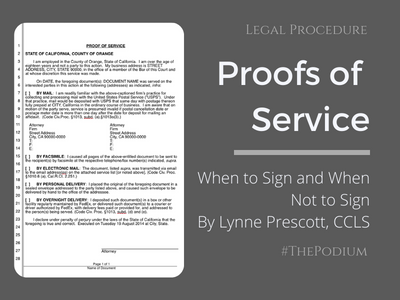
By Lynne Prescott, CCLS
The issue of whether proofs of service should be signed or unsigned has come up multiple times in recent years – – in my office, in discussions I have had with other legal professionals throughout California, and through e-mails sent to me by legal professionals outside of my office whose attorneys are unclear about when proofs of service should be signed and not signed.
The Code of Civil Procedure addresses this issue in section 1013(b) and subsequent subsections, and clearly states that the proof of service should be UNSIGNED at the time of service. Once service has been effected, the proof of service can be signed (and must be signed when filing with the courts). But again, the proof of service should NOT be signed at the time of service. To do so would be committing perjury, stating that you have mailED, faxED, or e-mailED, your document before you have even done it.
Let me give you an example. Your office is filing a motion and all the requisite supporting documents in the superior court. Everything has been signed by your attorney, and you are preparing your proofs of service to attach to your documents so that you can get it out the door for service on the other parties and filed with the court. Do you sign the proofs of service at this point? NO. Why? Because you have not actually served those documents yet. Here’s what you do:
Prepare the proofs of service with all the relevant information, using the current date as your date of service, and your name typed underneath the signature line (do not sign yet).
Attach the UNSIGNED proof of service to each document.
Make the appropriate number of copies for serving by mail, overnight mail, or hand delivery, or scan to PDF if serving via e-mail.
Go ahead and mail/overnight mail/fax/e-mail/hand deliver your documents with the UNSIGNED proofs of service attached.
Now that you have actually servED your documents, you may now SIGN your proofs of service.
Make copies of your motion documents with your signed proofs of service attached and file them with the court (or scan if e-filing).
Although the Code of Civil Procedure was revised some time ago regarding signatures on proofs of service, there is obviously still a great deal of confusion among legal support professionals as well as attorneys on this matter. In my office, we have even been challenged on more than one occasion as to the validity of service when the proof of service is unsigned.
One legal support professional told me that her attorney actually MAKES her sign the proofs of service, even though she has informed him of the proper procedure. He is, essentially, directing her to break the law and commit perjury!
The Judicial Council of California has even made it clear that proofs of service are not to be signed at the time of service, as evidenced by the language included on many of the Judicial Council forms containing a proof of service.
Listed below are links to two excellent articles on this subject, the first of which was actually written by a discovery referee:
https://www.resolvingdiscoverydisputes.com/motions/sign-not-sign-proof-service/ http://simasgovlaw.com/media/blog/proof-service-unsigned/
When you or your support staff are challenged on the effectiveness of your service based on an unsigned proof of service, please refer the person to Code of Civil Procedure section 1013(b). Don’t be the person who signs that proof of service saying you served a document before it was actually done. Do it the right way, and do it legally, per the statute.
Categorized in: Legal Procedure
| << previous | next >> |








